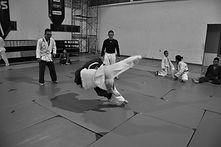Self Defense: 5:45 - 6:20pm
Intro/White Belt: 6:35 - 6:55pm
New Students:
Tuesday
Thursday
Intro/White Belt: 4:45 - 5:15pm
Tuesday
Thursday
Intro: 4:45 - 5:15pm
Black Belt: 5:20 - 5:55pm
Color Belt: 6:00 - 6:55pm
Sparring: 7:00 - 7:45pm
Kobudo: 4:45 - 5:40pm
Self Defense: 5:45 - 6:20pm
Intro/Eskrima: 6:25 - 6:55pm
Tournament/Open: 7:00 - 7:45pm
PROGRAMS

KOBUDO


KARATE

SELF DEFENSE

SPARRING
KOBUDO
Kobudo is a Japanese term which can be traslated as "Old Martial Way of Okinawa". It generally refers to the weapon traditions of Okinawa. Some of the traditional Kobudo weapons are: Bo, Sai, Nanchaku, Eku, Tonfa, and Kama
ESKRIMA
Eskrima is a type of Filipino martial arts that involves fighting with sticks, swords, or knives. A fighter may use a single stick, called a solo bastón, or a double stick, called a double bastón. Armed and empty-handed techniques are taught simultaneously, so that the fighter is capable of practicing in either situation with equal skill and, oftentimes, similar technique.
KARATE
Karate is a Japanese martial art whose physical aspects seek the development of defensive and counterattacking body movements. The themes of traditional karate training are fighting and self-defense, though its mental and moral aspects target the overall improvement of the individual. This is facilitated by the discipline and persistent effort required in training. - Tulane
SELF DEFENSE
Self Defense is learning different techniques to use when you need to defend yourself against an attacker. Students will learn how to read body language, and ways block/prevent an attack from happening. They will also learn how to disarm, take down, and restrain an attacker.
SPARRING
Sparring is taking the techniques learned in Karate and applying them in a light contact fight between two people, while wearing protective gear. Sparring helps develop, understand, and apply the following skills: controlling distance, rhythm, timing, combinations, footwork, speed, balance, reaction, conditioning, and focus.
